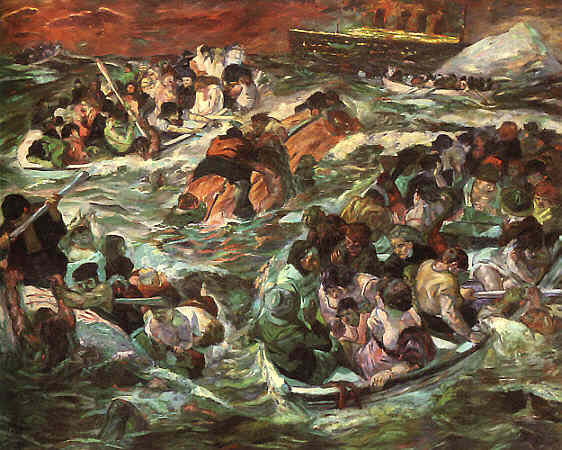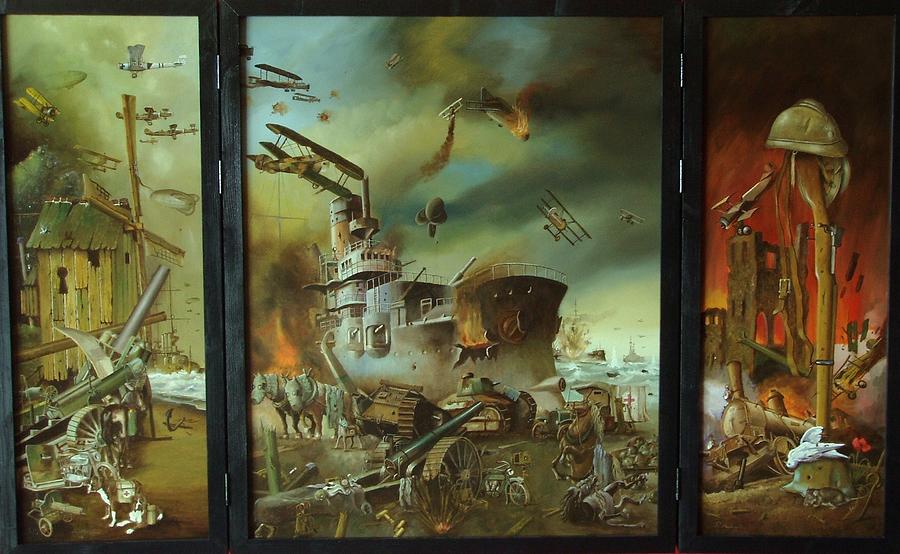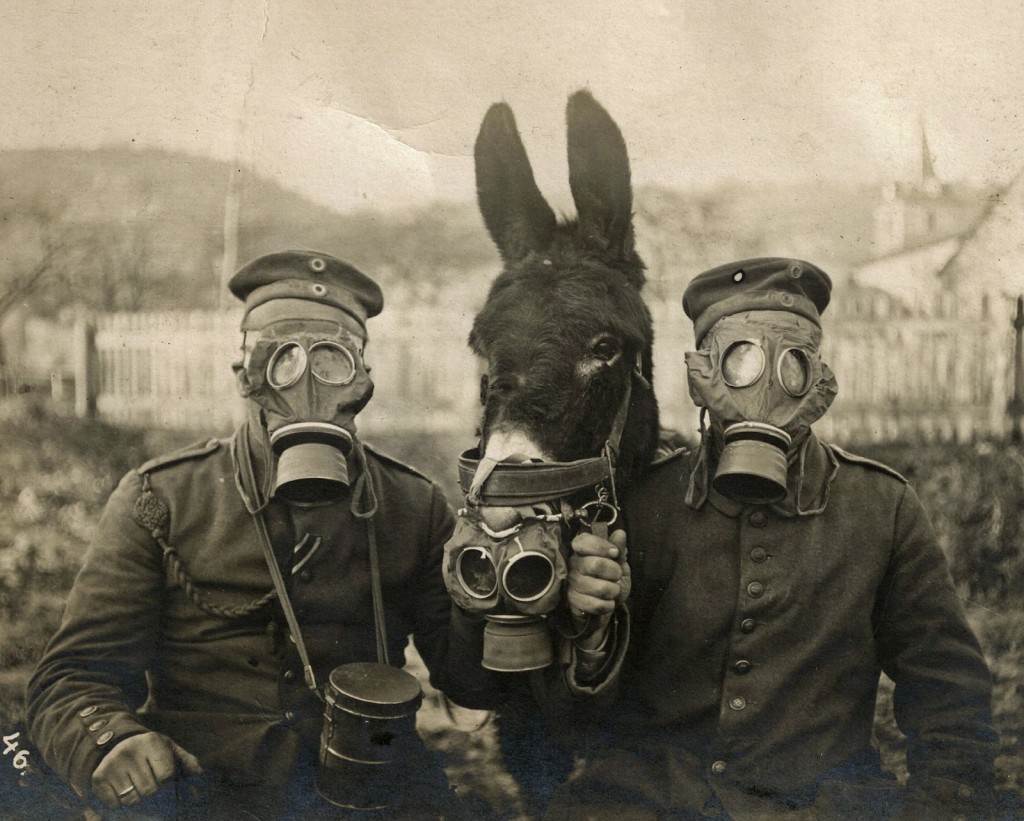No doubt we shall never understand the First World War completely. The malaise, the something sinister and strange lying beneath the prosperity of a seemingly newly minted modern age. The lust for violence, the belief in death and the ominous mystique of war seemed to be pushing the world towards its tawdry fate. Even leftist humanists like Thomas Mann were asking, “Is not war a purification, a liberation, an enormous hope.”

—Rulers who want to unleash war know very well that they must procure or invent a first victim. It need not be anyone of particular importance, and can even be someone unknown. Nothing matters except his death; and it must be believed that the enemy is responsible for this. Every possible cause of his death is suppressed except one: his membership in the group to which one belongs oneself.” (Elias Canetti, Crowds and Power)
Max Beckmann, Sinking of the Titanic, 1912—
(see link at end)…
Stach, a German writer based in Berlin, is careful not to over-emphasise Kafka’s reputation as a prophet of Nazi anti-Semitism. For him, such a view overlooks the fact that Kafka had lived through the technological violence of the first world war. At the insurance institute where he worked in Prague from 1908 almost to the end of his life, claimants had acquired facial tics and “hysterical tremors” from trench warfare, with its mustard gas and barrage fire. All across Europe, people had been sent to their deaths by the stroke of a bureaucrat’s pen; in Germany such bureaucrats would become known as Schreibtischtäter – “desk-murderers”. Read More:http://www.ft.com/cms/s/2/d3cbd90e-eed2-11e2-b8ec-00144feabdc0.html#axzz2mYjGmQzJ
What we do know was that the war was catastrophic: the hecatombs of dead, the apalling material waste, the destruction, and the pain of those four years tell us that. In our hearts we know that since the Great War nothing has really come right again in the world. The higher planes of society,warts and all gave way to mass conscription, an anonymity of the trenches, and calculated propaganda lies. In those four years Europe evolved many of the brutal features of the modern totalitarian state.

—TitleTriumph Of The Great War.ArtistPeter MeulenersMediumPainting – Oil On PanelDescriptionThe war is the only winner.—click image for source…
That WWII should be fought at all was the direct outcome of the spiritual wasteland that WWI engendered. Woodrow Wilson, greeting the Armistice, proclaimed to his fellow Americans that “everything” for which his countrymen had fought had been accomplished. America’s “fortunate duty.” But it was Robert Graves who more truly expressed the spirit of the nightmare from which the world awakened in 1918, when he wrote:
Armistice night hysteria did not touch our camp much, though some of the Canadians stationed there went down to Rhyl to celebrate in true overseas style. The news sent me out walking alone along the dyke above the marshes of Rhuddlan (an ancient battlefield, the Flodden of Wales), cursing and sobbing and thinking of the dead.
Siegfried’s famous poem celebrating the Armistice began:
“Everybody suddenly burst out singing, / And I was filled with such delight / As prisoned bi
must find in freedom . . .”But everbody did not include me.”
ADDENDUM:
(see link at end)…”Germany has declared war on Russia — swimming in the afternoon.” Franz Kafka’s diary entry of August 2, 1914, reflected one aspect of Europeans’ response to the start of the Great War: some Europeans were not surprised that war had broken out.
Many others were excited that it had. The popular mood on the eve of war was bright in most European cities. Large crowds gathered to express their opinions, persuading European statesmen to harden their diplomatic positions. Even as mobilization orders were issued during early August, European leaders had reservations about war. Those concerns were washed away by the crowds, who welcomed their leaders’ decisions to fight.
The spirit of nationalism that had helped trigger the war also helped to fuel it. In Berlin, crowds gathered in late July to wait for the Serbs’ response to Austria’s ultimatum. They cheered the news of Serbia’s resistance, which meant war. “Et jeht los,” they cheered. ‘It is on.’ New crowds formed, unified, a Berlin reporter wrote, by “war, war, and a sense of togetherness.”
… But as war neared, many of these protesters shared in the expressions of nationalism. By August 1, the Association of German Jews was declaring “that every German Jew is ready to sacrifice all the property and blood demanded by duty.”
Young Europeans rushed to serve their country and to experience the excitement of battle. Fighting for one’s country was seen as the highest form of self-sacrifice. One writer commented “thousands of men eager to fight would jostle one another outside recruiting offices, waiting to join up…” The writer continued: “The word ‘duty’ had a meaning for them, and the word ‘country’ had regained its splendor.”
Soldiers left their towns and cities for the front, singing patriotic songs as their fellow citizens threw flowers and good wishes their way. In Paris, men marched while singing the “Marseillaise,” the French national anthem. Spectators called to the troops to “send me the Kaiser’s moustache.”
Europe’s cultural crisis of the spirit also fueled support for the war. Many Europeans, especially intellectuals, had grown tired of peace and welcomed the excitement, the heroism, and the national unity that war would produce. Even as the blood began to flow, the German writer Thomas Mann asked how one could not “praise God for the collapse of a peaceful world with which he was fed up, so exceedingly fed up.” The war, for Mann and other Germans, was seen as “purification” and “liberation.”
The exuberance of millions calling for war astonished others. The great British philosopher Bertrand Russell sadly wrote of his “amazement that average men and women were delighted at the prospect of war…The anticipation of carnage was delightful to something like 90% of the population. I had to revise my views on human nature.” But Europeans’ memories of war and its carnage were very distant. Localized wars, usually short in duration, had occurred in Germany, France, Russia, and the Balkans. The last great land war involving mass armies had taken place a century earlier during Napoleon’s rampage through western Europe. Few Europeans understood that developments in technology ensured a much bloodier war. Read More:http://teacherweb.ftl.pinecrest.edu/snyderd/mwh/webquests/8-wwi/8-welcome.htm






 COMMENTS
COMMENTS
Here in the Caribbean some people think that hurricanes are good to “purify” life: they take old trees down, houses badly constructed, and the like.
And boredom is what elicit the feeling of excitement in young males, relating to war. According to my reading of some films.
Merry Christmas, Dave.